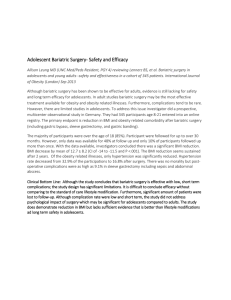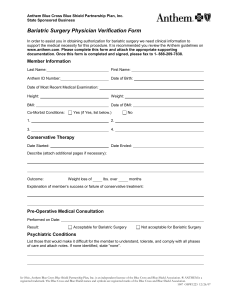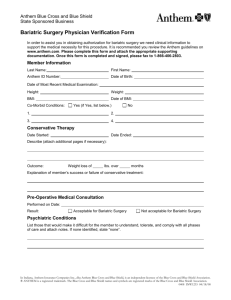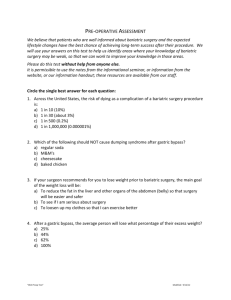Reoperative Bariatric Surgery, Achieving Insurance Authorization
advertisement
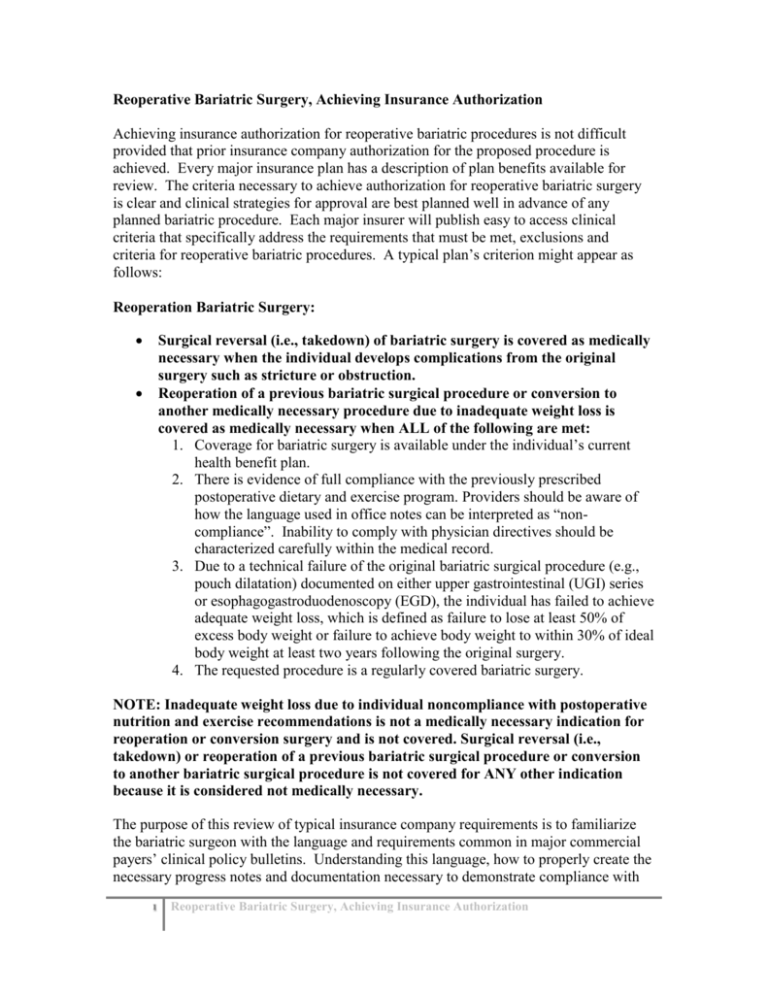
Reoperative Bariatric Surgery, Achieving Insurance Authorization Achieving insurance authorization for reoperative bariatric procedures is not difficult provided that prior insurance company authorization for the proposed procedure is achieved. Every major insurance plan has a description of plan benefits available for review. The criteria necessary to achieve authorization for reoperative bariatric surgery is clear and clinical strategies for approval are best planned well in advance of any planned bariatric procedure. Each major insurer will publish easy to access clinical criteria that specifically address the requirements that must be met, exclusions and criteria for reoperative bariatric procedures. A typical plan’s criterion might appear as follows: Reoperation Bariatric Surgery: Surgical reversal (i.e., takedown) of bariatric surgery is covered as medically necessary when the individual develops complications from the original surgery such as stricture or obstruction. Reoperation of a previous bariatric surgical procedure or conversion to another medically necessary procedure due to inadequate weight loss is covered as medically necessary when ALL of the following are met: 1. Coverage for bariatric surgery is available under the individual’s current health benefit plan. 2. There is evidence of full compliance with the previously prescribed postoperative dietary and exercise program. Providers should be aware of how the language used in office notes can be interpreted as “noncompliance”. Inability to comply with physician directives should be characterized carefully within the medical record. 3. Due to a technical failure of the original bariatric surgical procedure (e.g., pouch dilatation) documented on either upper gastrointestinal (UGI) series or esophagogastroduodenoscopy (EGD), the individual has failed to achieve adequate weight loss, which is defined as failure to lose at least 50% of excess body weight or failure to achieve body weight to within 30% of ideal body weight at least two years following the original surgery. 4. The requested procedure is a regularly covered bariatric surgery. NOTE: Inadequate weight loss due to individual noncompliance with postoperative nutrition and exercise recommendations is not a medically necessary indication for reoperation or conversion surgery and is not covered. Surgical reversal (i.e., takedown) or reoperation of a previous bariatric surgical procedure or conversion to another bariatric surgical procedure is not covered for ANY other indication because it is considered not medically necessary. The purpose of this review of typical insurance company requirements is to familiarize the bariatric surgeon with the language and requirements common in major commercial payers’ clinical policy bulletins. Understanding this language, how to properly create the necessary progress notes and documentation necessary to demonstrate compliance with 1 Reoperative Bariatric Surgery, Achieving Insurance Authorization these policies, is the easiest way to obtain insurance authorization and will avoid the need to include legal assistance and law firms should appeals be necessary to override denials. Denials will most commonly occur as a result of failing to meet the requirements published in each insurance company’s respective and specific clinical policy bulletins. One stage and two stage bariatric procedures can be performed. Most two stage operations will involve either removal of an adjustable gastric band or reversal of a previous bariatric operation; for example, reversal of gastric bypass or duodenal switch, followed by an eventual second bariatric operation at a later date. Be prepared from the very first initial evaluation of potential two stage reoperative candidates that the second operation might require authorization based on the requirements published for patients undergoing a primary bariatric procedure. Just because a reversal or takedown of a previous bariatric operation is approved does not insure that a plan for a second stage bariatric procedure at a later date will be approved. It is best to understand the requirements for obtaining authorization for a specific bariatric operation, i.e., gastric bypass, sleeve gastrectomy, and duodenal switch, and to be prepared that these two stage patients might also need to satisfy those requirements as well in order to complete any planned reoperation in two stages. 1. Understanding Authorization Requirements for Reoperative Bariatric Surgery Procedures - Selection Criteria. Each major insurance company will have a short, concise paragraph published regarding the selection criteria that must be met with respect to reoperative bariatric procedures. For example, one major insurer’s policy requirements consist of 8 lines of clear requirements and are broken down into the requirements to perform the following: a. Removal of laparoscopic adjustable gastric band b. Correction of complications from bariatric surgery, obstructions, erosions, prolapse, strictures, etc. c. Repeat bariatric surgery to address individuals who have not met with success from an original bariatric operation including conversions to a different operation, reoperation of an original operation, and replacement of an adjustable gastric band due to a complication or a previous adjustable gastric band. In order to obtain authorization for a reoperation or previous bariatric procedure each plan will publish specific clinical criteria that must be met in order to obtain authorization these requirements must be clinically documented either in the patient’s progress notes or addressed in a summary letter for authorization. For example: Removal of adjustable gastric band can be as simple as “Medically necessary when recommended by the member’s physician.” In this situation little more than a documented problem justifying the recommendation is all that is needed to obtain an authorization for removal of an adjustable gastric band. 2 Reoperative Bariatric Surgery, Achieving Insurance Authorization Be aware however that once the adjustable gastric band is removed this patient may very well need to meet the criteria specified for gastric bypass, sleeve gastrectomy, or duodenal switch should you plan to perform these procedures at a later date. In these situations patients may need to satisfy specific requirements such as meeting BMI requirements including BMI 35-39.9 with specific defined comorbid conditions. Clinically significant obstructive sleep apnea, coronary artery disease with objective documentation, medically refractory hypertension, and type II diabetes mellitus. 2. Persistent Obesity and Reoperative Bariatric Surgery. What if a patient did not lose enough weight following a previous bariatric operation? Clinical criteria for reoperative bariatric procedures that are being proposed for persistent obesity can include published requirements such as the following: “Repeat surgical procedures for conversion to another surgical inadequate weight loss, (that is, surgical complication of a prior considered medically necessary following criteria are met:” reoperation or procedure for unrelated to a procedure) are when all the The individual continues to meet all the medical necessity criteria for bariatric surgery and There is documentation of compliance with the previously prescribed postoperative dietary and exercise program; and 2 years following the original surgery, weight loss is less than 50% of pre-operative excess body weight and weight remains at least 30% over ideal body weight If proposing a reoperative bariatric procedure for persistent obesity it is essential to prepare the request for authorization with the goal of addressing each requirement specifically. DO NOT use language such as “the patient has failed gastric bypass” as this type of language is inaccurate can be interpreted as noncompliance with the prescribed post-operative dietary and exercise program and will lead to a denial. Rather address each bullet point outlined in the plan policy bulletin using language that addresses each point. “Mrs. Jones is a 52 year old woman who underwent laparoscopic gastric bypass four years ago and presents 3 Reoperative Bariatric Surgery, Achieving Insurance Authorization with a BMI of 44. She continues to meet criteria to be considered a candidate for bariatric surgery and meets the necessary criteria to be considered an appropriate candidate with respect to medical necessity for bariatric surgery. She has been compliant with the recommended postoperative dietary and exercise programs, and overall weight loss since the initial procedure was performed has resulted in less than the expected 50% of pre-operative excess body weight loss and remains more than 30% over ideal body weight.” An opening statement such as depicted above will need to be corroborated with supporting documentation that demonstrates that this patient has been compliant. If no such documentation can be produced, then enrolling the patient in a supervised nutritional and exercise program may be necessary. If no such documentation is ever produced the likelihood of a denial based on noncompliance or failure to provide documentation of compliance is very high. 3. Requirements for Physician Supervised Nutritional and Exercise Programs and Multidisciplinary Surgical Preparatory Regimens: Many plans will require members to not only demonstrate that they have made concerted efforts at weight loss in the past but that they have also completed physician supervised nutritional and exercise programs or multidisciplinary surgical preparatory regimen AND psychological evaluation and clearance. Physician supervised nutritional and exercise programs. These requirements are best explained to the patient as possible requirements that will need to be fulfilled in order to achieve a second operation even before the patient undergoes a first stage procedure, removal of lap band, or other bariatric procedure. Understanding exactly what the insurance company is requiring and explaining those requirements to the patient will allow an easier authorization process and prevent unnecessary delays or attempts at appeals. Even though appeals can often be successful they will also result in delays in time that in many cases will exceed the time needed to complete the required physician supervised nutritional and exercise program requirement. If there is a planned three to six month period between initial stage and second stage reoperative procedures it is best to begin the process necessary to satisfy these requirements from the outset of your evaluations. Understanding exactly what is considered appropriate documentation will require that the bariatric surgeon review the language included in the clinical policy bulletin and meet those requirements from the outset of your clinical evaluation. Documentation of participation is absolutely necessary to satisfy these requirements and typically include the following 4 Reoperative Bariatric Surgery, Achieving Insurance Authorization a. Documentation of participation must be “documented in the medical record by an attending physician who supervised the member's participation.” The language of who can administer these types of programs is also clearly defined as well as the type of program that is considered acceptable. “The nutrition and exercise program may be administered as part of the surgical preparative regimen, and participation in the nutrition and exercise program may be supervised by the surgeon who will perform the surgery or by some other physician.” b. In every case the medical records must document compliance with the program. This documentation requires monthly face to face visits with the provider and documentation of progress and participation with the program. 4. WEIGHT GAIN during physician supervised nutritional and exercise programs. It is increasingly common that during required three month and six month requirements for nutritional and exercise programs many plans will require that the patient must not have a net gain in weight during the program. This language is simple and easy to understand. If your patient sustains a net weight gain during completion of the required nutritional and exercise program you will be denied authorization. Appeals will be time consuming, expensive, and reversal of appeals will not be assured and may require the participation of a law firm specializing in insurance appeals to obtain a successful appeal. If there is a No Weight Gain requirement included in the clinical policy bulletin you will be denied authorization and you will have no other alternative but to extend the time period of the physicians supervised nutritional and exercise program or begin an appeals process. a. In most cases a physician’s summary letter will not be accepted as an alternative to documentation requirements for medical records demonstrating ongoing assessment of patient’s progress throughout the completion of the course of these nutrition and exercise programs. b. Monitoring of nutrition and exercise programs will require that monitoring occur by a physician working in cooperation with the dietician and not remotely. 5. Duration of Nutrition and Exercise Programs. Duration of programs can vary from 3 months to a cumulative total of 6 months within the 2 years prior to surgery. In many situations language will be included that there is a specific participation of at least 3 or 6 consecutive months duration. Paying attention to this language from the outset of your surgical plan will avoid having to delay the patient another 3 or 6 months while they complete the requirement that these programs be consecutive. 6. Multidisciplinary Pre-Operative Preparatory Program. Can be an alternative to nutritional and exercise programs and are specifically defined in the policy 5 Reoperative Bariatric Surgery, Achieving Insurance Authorization bulletin. Typically the requirements must meet several clinical criteria including: documented completion of a behavior modification program, documented consultation with a dietician or nutritionist, “Documentation in the medical record of the member's participation in the multi-disciplinary surgical preparatory regimen at each visit”, exercise regimen with supervision by qualified individual (supervision is often not defined but supervision must be documented in the medical record), and reduced calorie nutritional program supervised by a dietician. In order to satisfy a requirement for a multidisciplinary pre-operative preparatory program break the requirements down into a bullet list of what must be documented and submitted in order to achieve authorization: a. Behavior Modification Program. How is this requirement going to be met? Qualified professionals could include clinical psychologists, internists, bariatric surgeons, and qualified RNs but progress and participation must be documented in medical records and progress notes and not simply summarized in a summary letter. b. Consultation with Dietician or Nutritionist. This usually requires monthly documented visits which must address participation of the patient’s progress and compliance and participation. Many plans now require that the patient not gain weight during this process and must either lose weight or not achieve any net weight gain. c. Exercise Regimen. Again documentation that there is some degree of supervision and participation with a defined exercise regimen must be addressed. There is typically no definition as to what the exercise regimen must include and can vary from a documented program of daily walking to a program of supervised exercise classes. Regardless of what type of exercise program is implemented the medical record must reflect that the program is supervised and that participation is documented. Failure to address and document behavior modification, dietary consultations and participation with an exercise program will often result in denials and in many cases the entire program will need to be repeated during which time an appeals process will need to be initiated. Denials are most commonly the result of failing to review the requirements of the policy bulletin and failing to provide documentation that the requirements have been successfully met as per the specific requirements of the individual plan. Do not assume that by having the patient meet monthly with a dietician that the requirements for a behavior modification program have been met. Unless there are progress notes specifically addressing that a portion of the clinical visit was used to address the requirement to complete a behavior modification program it is very likely that the patient will receive a denial for failing to address that specific requirement. 7. What if the plan has specifically included a section “Not Medically Necessary”? For example, some major medial policies regarding surgery for clinically severe 6 Reoperative Bariatric Surgery, Achieving Insurance Authorization obesity includes language specific to exclusions for bariatric reoperative surgery that is considered “not medically necessary”. These exclusions are important to understand prior to initiating an evaluation and to avoid submitting an authorization requesting reoperation of a procedure whose justification for reoperation is based on one of the criteria specifically excluded as “not medically necessary.” Indications for reoperative bariatric surgery can often include procedures that are considered “investigational” by the health plan and are important to understand, so that in the event a request for authorization is denied it does not come as a surprise following a lengthy and often expensive preoperative evaluation. Items commonly excluded as “not medically necessary” include; Stretching of the stomach pouch due to overeating. Dilated gastric pouches need to have specific documentation supported by specific diagnostic studies that clearly indicate a pouch did not dilate and was actually the result of an inadequate initial bariatric procedure in order to obtain authorization. Dilated gastric pouches that do not have documentation supporting the reason why the pouch is enlarged will typically be rejected as due to overeating. Gastric bypass using a Billroth type II anastomosis (mini-gastric bypass) is often specifically stated as being “investigational, experimental and not medically necessary.” Laparoscopic adjustable band over gastric bypass. Laparoscopic adjustable band over sleeve gastrectomy. Specific malabsorptive procedures including jejunoileal bypass, biliopancreatic bypass without duodenal switch, or very long limb (greater than 150 cm) gastric bypass are often excluded as experimental or investigational and will be denied authorization as reoperative procedures. It is important to completely review the published policy bulletin as it can significantly affect the quality of the documentation you might provide in any request for authorization. For example, the very same insurer that excludes reoperation of pouch enlargement due to overeating as “not medically necessary” will issue an authorization for reoperation of pouch enlargement due to chronic vomiting. Surgical repair following gastric bypass and gastric restrictive procedures is considered medically necessary when there is documentation of a surgical complication related to the original surgery, such as a fistula, obstruction, erosion, disruption/leakage of a suture/staple line, band herniation, or pouch enlargement due to vomiting. Careful documentation and understanding of the specifics of the benefits and requirements for authorization can avoid denials and delays when requesting authorization for reoperative bariatric operations and procedures. 7 Reoperative Bariatric Surgery, Achieving Insurance Authorization
